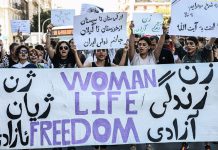“If I had a choice, I would not have come to Hong Kong,” she says. Hong Kong may be the place she is raising her family, but she does not have a sense of belonging. “Even though I’ve got a Hong Kong Identity Card, I am still a northerner.”
Her friend Cherry also finds it hard to feel at home in Hong Kong. Cherry comes from Guangdong and is still waiting to get her Hong Kong Identity Card. Before coming here, she thought Hong Kong was clean and the people were more polite and educated. She has since discovered people also use foul language here.
She used to work for a design company in Shenzhen where the pace of work was leisurely and staff went home at five o’clock. In Guangdong, Cherry slept early and woke early. Now, while she still wakes early but sleeps late, she still finds the life of Hong Kong people much too busy and hard to follow.
Over the years, people have migrated to Hong Kong from the mainland for different reasons. As adults, some came in search of a better life, some to raise their families. Others came as children accompanying their parents and while they did not choose to come, they have become Hongkongers with distinct views about their identity.
Cassie Wan Yim-ting, a first-year student at Hong Kong Polytechnic University, came to Hong Kong with her parents in 1998. Wan says she is glad to be a Hongkonger when it comes to enjoying human rights and freedoms. During the Lunar New Year holiday, she visited her relatives in the mainland and found Facebook and Yahoo were blocked. She questioned the necessity of such tight control over the internet and felt herself lucky to enjoy more freedom in Hong Kong.
However, she does not stress her Hong Kong identity and is comfortable saying she is a Chinese. While being Chinese does not make you a Hongkonger, “it makes no sense to say you are a Hongkonger but not a Chinese,” says Wan. She believes the mainland is not as well developed as Hong Kong, but says this does not mean Hong Kong people are superior to people in the mainland.
For Wan, the mainland holds great opportunities for career development. While most of her classmates are unwilling to start their careers there, she wants to take advantage of her double identity to make a mark there.
The mainland also offers her other perspectives. Although she has lived in Hong Kong since she was 10, Wan still cannot figure out why people have to walk so fast. She recalls looking for a shop with a friend and walking so fast that they walked right past it without noticing. Hong Kong people are hardworking and law-abiding, she says, but sometimes they tend to overlook what is around them. She thinks the pace of life on the mainland is more leisurely.
Rayo Kwok King-yan, another first-year student at Hong Kong Polytechnic, came to Hong Kong in 1999. He is also comfortable with being Chinese and disapproves of those who try to change their identity. “You can bleach your skin white, dye your hair blonde and wear coloured contact lenses,” he says, “but deep inside your bones, you are still Chinese.”
Kwok, who is studying fashion and textiles, envisages he will have to move between Hong Kong and the mainland in his future work. But he says Hong Kong is a place he wants to live in. “I appreciate the fighting spirit here,” he says.
Kwok also believes that one of the strengths of Hong Kong people is their language ability. He takes his ability to speak fluent English as a criterion to define himself as a Hongkonger. That is why he did grammar exercises every day when he was in primary school.
According to Professor Eric Ma Kit-wai, of the School of Journalism and Communication of The Chinese University of Hong Kong, the flexible identity of these new immigrants is called double identification.
Ma says there have been changes to how mainland immigrants regard themselves, and the changes are closely related to development in China. In the 1970s, Hong Kong was better off and mainland immigrants, who were mainly working class, felt inferior. They would try to disguise their accents and work hard to improve their Cantonese. They were eager to learn to become Hongkongers.
But as China has become more culturally diverse and economically stronger, Hongkongers are less repelled by mainlanders’ living style. The distinction between mainland immigrants and Hongkongers is no longer obvious. “We cannot say Hongkongers and mainlanders are different in nature. They are all Chinese,” says Ma.






































